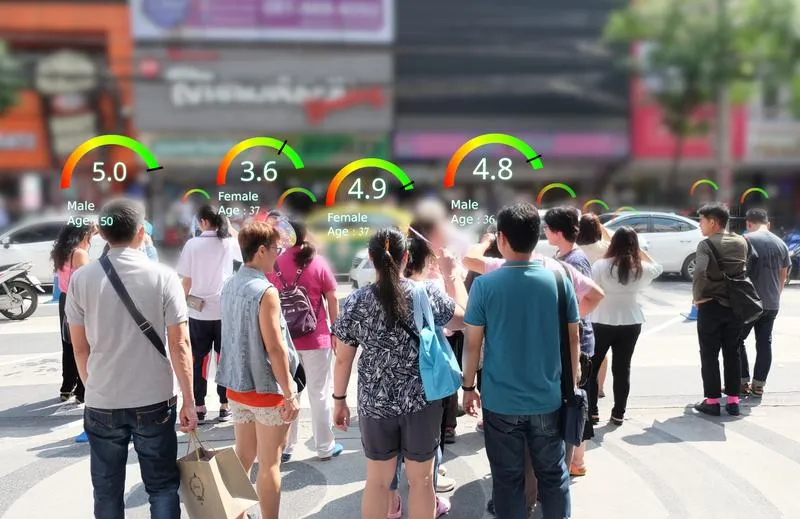
How Social Credit Systems Could Quietly Make Their Way to America
For years, Americans have heard about China’s social credit system, a government-controlled program that rewards and punishes citizens based on their behavior. Actions like paying bills on time can earn rewards, while dissent or criticism of the government can lead to restrictions on travel, employment, and more. While such a system may seem incompatible with American values of freedom and individuality, the reality is that elements of a social credit system are already creeping into everyday life in the U.S.
From corporate surveillance to digital monitoring, the groundwork is being laid for a system that could have far-reaching consequences for personal freedom and autonomy.

What is a Social Credit System?
A social credit system assigns individuals scores based on their behavior and decisions, using these scores to grant or restrict access to various services and opportunities. In China, this system is tightly controlled by the government and linked to:
Financial behavior: Timely payments and good credit scores earn higher ratings.
Social behavior: Associating with “undesirable” individuals or criticizing the government can lower scores.
Public infractions: Failing to follow laws or regulations, like jaywalking, results in penalties.
While such a system might seem unimaginable in the U.S., parallels are beginning to emerge in the private sector and beyond.
Are We Seeing the Rise of a Social Credit System in America?
While the U.S. doesn’t have a centralized government-controlled social credit system, private companies, financial institutions, and even social platforms are implementing systems that echo its principles:
Corporate Surveillance:
Companies increasingly monitor employees’ behavior, both at work and online, using this data to influence promotions, terminations, and other decisions.
Social media posts deemed “offensive” or “controversial” have led to individuals losing jobs or opportunities, creating a culture of self-censorship.
Financial Penalties:
Some banks and credit card companies are tracking purchases and assigning risk scores based on spending patterns. For instance, frequent purchases at firearms stores or “high-risk” businesses could flag an individual for additional scrutiny.
ESG (Environmental, Social, and Governance) scores for businesses are expanding to individuals, where personal behaviors may one day influence access to loans or investments.
Social Media Monitoring:
Platforms like Facebook and Twitter use algorithms to identify and flag content. In some cases, flagged content can lead to account bans or even influence real-world consequences, such as job loss or financial penalties.
Your social media behavior—likes, shares, and comments—could be used to create a profile that impacts future opportunities.
Credit and Reputation Systems:
Services like Uber, Airbnb, and DoorDash already rate users based on their behavior. Low ratings can lead to restricted access or outright bans, creating a system where individuals must maintain favorable scores to participate.
Why is This Happening?
The rise of social credit-like systems in the U.S. is driven by several factors:
Data-Driven Decision Making: Companies and governments increasingly rely on data to assess risk and manage resources, often justifying invasive monitoring as necessary for efficiency and security.
Technological Advancements: The proliferation of AI and big data has made it easier than ever to track, analyze, and score individual behaviors on a massive scale.
Public Pressure: Cancel culture and societal demand for accountability have encouraged organizations to adopt systems that penalize perceived bad behavior.
Corporate and Financial Agendas: Institutions implementing ESG criteria are extending their influence to individual behaviors, potentially linking access to services with compliance to specific standards.
What Are the Risks of a Social Credit System?
Erosion of Privacy: Social credit systems rely on constant surveillance, eroding the fundamental right to privacy. The more behavior is monitored and scored, the less room there is for personal freedom.
Increased Inequality: A social credit system could disproportionately affect vulnerable populations, penalizing individuals for behaviors linked to socioeconomic conditions rather than personal choices.
Self-Censorship: Fear of losing opportunities or privileges could lead individuals to self-censor, avoiding certain topics, associations, or actions to maintain favorable scores.
Loss of Autonomy: When access to services is tied to behavior, individuals lose control over their lives, forced to conform to externally imposed standards.
What Can Be Done to Prevent a Social Credit System in America?
While the rise of these systems is concerning, there are steps individuals and policymakers can take to preserve freedom and privacy:
Advocate for Privacy Protections: Support legislation that limits data collection and requires transparency from corporations and governments about how personal data is used.
Educate Yourself: Understand how your data is being collected and used. Be mindful of what you share online and through digital transactions.
Push for Decentralization: Decentralized technologies, like blockchain, could offer alternatives to centralized control by providing greater transparency and user control.
Hold Corporations Accountable: Consumers have the power to demand better practices from businesses, pushing back against invasive monitoring and punitive policies.
Conclusion: Freedom vs. Control
America was founded on principles of freedom and individuality, but the rise of social credit-like systems threatens to undermine these values. While these systems may not yet be centralized or government-controlled, the creeping influence of private surveillance, financial penalties, and social monitoring is a wake-up call.
As Americans, it’s critical to remain vigilant and proactive, pushing back against policies and practices that prioritize control over freedom. The decisions made today will determine whether the U.S. remains a land of liberty or succumbs to the quiet encroachment of a social credit system.
